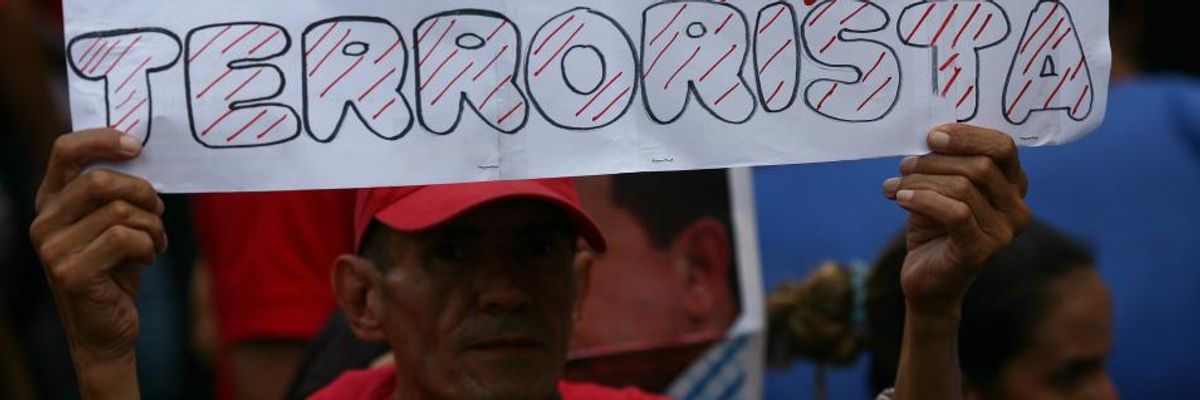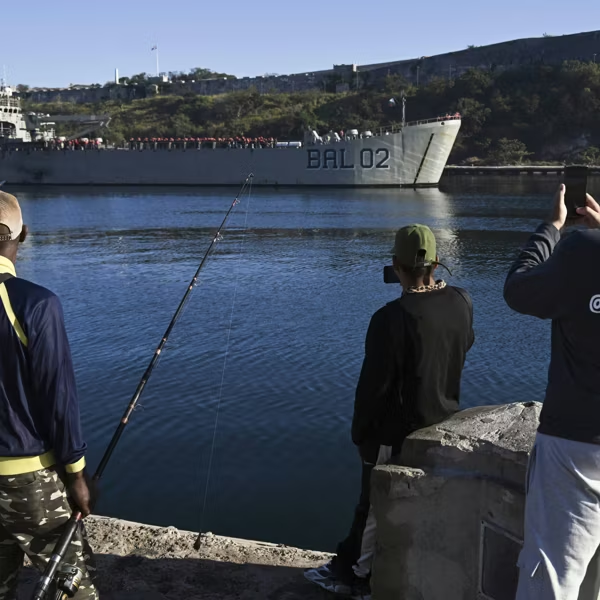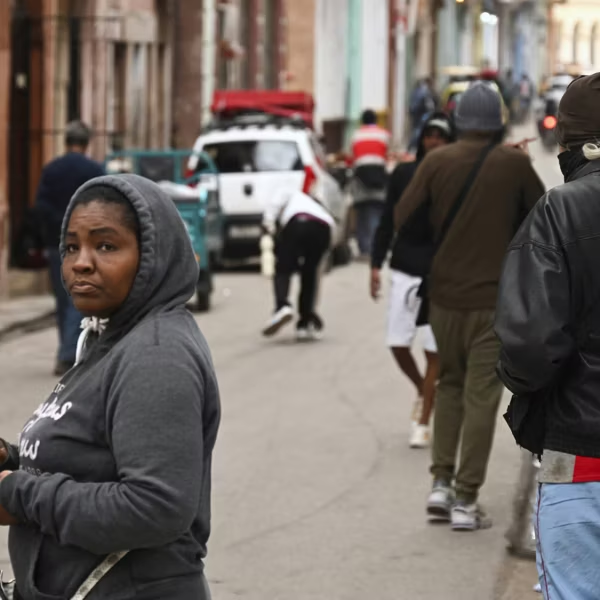
"Trump Terrorist" is written on the poster of a demonstrator at a rally against the new U.S. sanctions in Caracas, Venezuela on August 7, 2019. (Photo: Boris Vergara/Picture Alliance via Getty Images)
Warning of 'Severe' Harm to Millions of People, UN Human Rights Chief Condemns Trump Embargo Against Venezuela
"Wide-ranging unilateral sanctions can end up denying people's fundamental human rights, including their economic rights as well as the rights to food and health."
The United Nations' high commissioner for human rights on Thursday condemned the Trump administration's embargo against Venezuela and warned the far-reaching sanctions could deny food, medicine, and other necessities to millions of people.
"I am deeply worried about the potentially severe impact on the human rights of the people of Venezuela of the new set of unilateral sanctions imposed by the U.S. this week," U.N. human rights chief Michelle Bachelet said in a statement.
"I am deeply worried about the potentially severe impact on the human rights of the people of Venezuela of the new set of unilateral sanctions imposed by the U.S. this week."
--Michelle Bachelet, U.N. high commissioner for human rights
"I fear that they will have far-reaching implications on the rights to health and to food in particular," Bachelet said, noting the sanctions will likely "exacerbate the crisis for millions of ordinary Venezuelans."
As Common Dreams reported Tuesday, U.S. President Donald Trump signed an executive order freezing all assets of Venezuelan officials and barring any transactions with them.
Critics decried the Trump administration's embargo as part of a broad "economic terrorism" campaign aimed at ousting elected Venezuelan President Nicolas Maduro.
Far-reaching U.S. sanctions have already had a devastating impact on the Venezuelan people and economy. According to a study published by the Center for Economic and Policy Research (CEPR) in April, Trump's sanctions against Venezuela killed over 40,000 people between 2017 and 2018.
Economist Mark Weisbrot, a co-author of the study, called the sanctions illegal and said they "are depriving Venezuelans of lifesaving medicines, medical equipment, food, and other essential imports."
Bachelet said the Trump administration's embargo will only intensify that deprivation.
"There is a significant body of evidence showing that wide-ranging unilateral sanctions can end up denying people's fundamental human rights," said Bachelet, "including their economic rights as well as the rights to food and health."
The U.N. rights chief's statement came after U.S. national security adviser John Bolton touted the embargo as a way to remove Maduro and dismissed calls for diplomatic talks.
"The time for dialogue is over. Now is the time for action," Bolton said during a summit in Peru, just weeks after the U.S.-backed effort to overthrow Maduro by force failed.
Jorge Arreaza, Venezuela's foreign minister, denounced the Trump administration's embargo as "new and serious aggression" designed to inflict "severe wounds on Venezuelan society."
An Urgent Message From Our Co-Founder
Dear Common Dreams reader, The U.S. is on a fast track to authoritarianism like nothing I've ever seen. Meanwhile, corporate news outlets are utterly capitulating to Trump, twisting their coverage to avoid drawing his ire while lining up to stuff cash in his pockets. That's why I believe that Common Dreams is doing the best and most consequential reporting that we've ever done. Our small but mighty team is a progressive reporting powerhouse, covering the news every day that the corporate media never will. Our mission has always been simple: To inform. To inspire. And to ignite change for the common good. Now here's the key piece that I want all our readers to understand: None of this would be possible without your financial support. That's not just some fundraising cliche. It's the absolute and literal truth. We don't accept corporate advertising and never will. We don't have a paywall because we don't think people should be blocked from critical news based on their ability to pay. Everything we do is funded by the donations of readers like you. Will you donate now to help power the nonprofit, independent reporting of Common Dreams? Thank you for being a vital member of our community. Together, we can keep independent journalism alive when it’s needed most. - Craig Brown, Co-founder |
The United Nations' high commissioner for human rights on Thursday condemned the Trump administration's embargo against Venezuela and warned the far-reaching sanctions could deny food, medicine, and other necessities to millions of people.
"I am deeply worried about the potentially severe impact on the human rights of the people of Venezuela of the new set of unilateral sanctions imposed by the U.S. this week," U.N. human rights chief Michelle Bachelet said in a statement.
"I am deeply worried about the potentially severe impact on the human rights of the people of Venezuela of the new set of unilateral sanctions imposed by the U.S. this week."
--Michelle Bachelet, U.N. high commissioner for human rights
"I fear that they will have far-reaching implications on the rights to health and to food in particular," Bachelet said, noting the sanctions will likely "exacerbate the crisis for millions of ordinary Venezuelans."
As Common Dreams reported Tuesday, U.S. President Donald Trump signed an executive order freezing all assets of Venezuelan officials and barring any transactions with them.
Critics decried the Trump administration's embargo as part of a broad "economic terrorism" campaign aimed at ousting elected Venezuelan President Nicolas Maduro.
Far-reaching U.S. sanctions have already had a devastating impact on the Venezuelan people and economy. According to a study published by the Center for Economic and Policy Research (CEPR) in April, Trump's sanctions against Venezuela killed over 40,000 people between 2017 and 2018.
Economist Mark Weisbrot, a co-author of the study, called the sanctions illegal and said they "are depriving Venezuelans of lifesaving medicines, medical equipment, food, and other essential imports."
Bachelet said the Trump administration's embargo will only intensify that deprivation.
"There is a significant body of evidence showing that wide-ranging unilateral sanctions can end up denying people's fundamental human rights," said Bachelet, "including their economic rights as well as the rights to food and health."
The U.N. rights chief's statement came after U.S. national security adviser John Bolton touted the embargo as a way to remove Maduro and dismissed calls for diplomatic talks.
"The time for dialogue is over. Now is the time for action," Bolton said during a summit in Peru, just weeks after the U.S.-backed effort to overthrow Maduro by force failed.
Jorge Arreaza, Venezuela's foreign minister, denounced the Trump administration's embargo as "new and serious aggression" designed to inflict "severe wounds on Venezuelan society."
The United Nations' high commissioner for human rights on Thursday condemned the Trump administration's embargo against Venezuela and warned the far-reaching sanctions could deny food, medicine, and other necessities to millions of people.
"I am deeply worried about the potentially severe impact on the human rights of the people of Venezuela of the new set of unilateral sanctions imposed by the U.S. this week," U.N. human rights chief Michelle Bachelet said in a statement.
"I am deeply worried about the potentially severe impact on the human rights of the people of Venezuela of the new set of unilateral sanctions imposed by the U.S. this week."
--Michelle Bachelet, U.N. high commissioner for human rights
"I fear that they will have far-reaching implications on the rights to health and to food in particular," Bachelet said, noting the sanctions will likely "exacerbate the crisis for millions of ordinary Venezuelans."
As Common Dreams reported Tuesday, U.S. President Donald Trump signed an executive order freezing all assets of Venezuelan officials and barring any transactions with them.
Critics decried the Trump administration's embargo as part of a broad "economic terrorism" campaign aimed at ousting elected Venezuelan President Nicolas Maduro.
Far-reaching U.S. sanctions have already had a devastating impact on the Venezuelan people and economy. According to a study published by the Center for Economic and Policy Research (CEPR) in April, Trump's sanctions against Venezuela killed over 40,000 people between 2017 and 2018.
Economist Mark Weisbrot, a co-author of the study, called the sanctions illegal and said they "are depriving Venezuelans of lifesaving medicines, medical equipment, food, and other essential imports."
Bachelet said the Trump administration's embargo will only intensify that deprivation.
"There is a significant body of evidence showing that wide-ranging unilateral sanctions can end up denying people's fundamental human rights," said Bachelet, "including their economic rights as well as the rights to food and health."
The U.N. rights chief's statement came after U.S. national security adviser John Bolton touted the embargo as a way to remove Maduro and dismissed calls for diplomatic talks.
"The time for dialogue is over. Now is the time for action," Bolton said during a summit in Peru, just weeks after the U.S.-backed effort to overthrow Maduro by force failed.
Jorge Arreaza, Venezuela's foreign minister, denounced the Trump administration's embargo as "new and serious aggression" designed to inflict "severe wounds on Venezuelan society."

